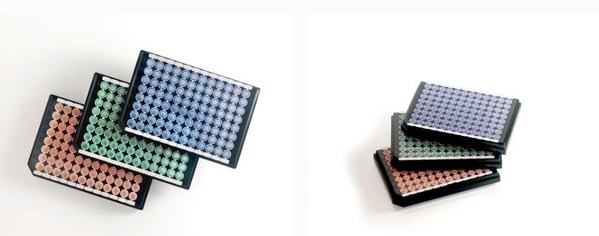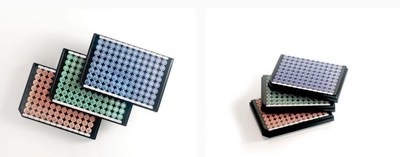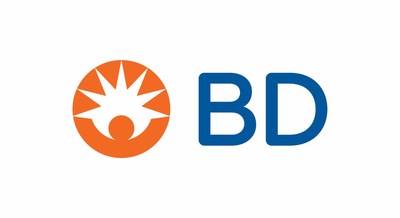FRANKLIN LAKES, N.J., July 22, 2020 /PRNewswire/ -- BD (Becton, Dickinson and Company) (NYSE: BDX), a leading global medical technology company, today announced that it received approval for a pre-market approval (PMA) supplement from the U.S. Food and Drug Administration (FDA) for an expanded version of its BD Onclarity™ HPV Assay. The PMA supplement includes the expansion for genotype reporting beyond HPV genotypes 16, 18, and 45 to include types 31, 51, 52, 33/58, 35/39/68, and 56/59/66 genotypes making the BD Onclarity™ HPV Assay the only FDA-approved assay to individually identify and report these genotype results.
The value of extended genotyping for cervical cancer screening and triage has been reported from large clinical studies since 2015.1-8 Additionally, the need for expanded HPV genotyping for cervical screening has been recognized since 2016.9 In many cases, the reporting of HPV genotypes with the screening test result could improve risk stratification and support risk-based patient management. The April 2020 publication of the ASCCP risk-based management consensus guidelines anticipated that extended genotyping would be introduced soon.10
"BD Onclarity™ extended genotyping is data-driven precision medicine at its best, helping us effectively and efficiently manage our patients," said Mark H. Stoler, MD Professor Emeritus of Pathology, University of Virginia Health System. "Contemporary management of women with abnormal cervical cancer screening results demands an assessment of their risk of pre-cancer. An abundance of recent science clearly shows that knowing the HPV genotype of the patient provides excellent differential stratification of those risks."1,4-8,11-13
"It is well known that different HPV genotypes carry different risk of cervical cancer, and without the specific knowledge of the HPV genotype in a screening sample many women will be over-treated needlessly," said Jesper Bonde, PhD, Senior Researcher and Molecular Pathology Laboratory Manager, Hvidovre Hospital, Denmark.12 "Screening strategies that employ HPV tests with simultaneous genotyping offer a simple way to improve cervical cancer screening to the benefit of the woman and health care providers by allowing risk stratification already on the screening sample."
The reporting of HPV genotypes with the screening tests and surveillance tests will facilitate same-genotype persistence tracking and risk-based management. A recent systematic review by Bottari et al concluded that, "evaluation of the HPV genotype persistence may represent a valid option to monitor patients treated for CIN 2+ lesions, because relapses were detected only in patients with persistence of the same genotype detected at baseline."11,13-15
"With this FDA approval, BD can now offer laboratories, clinicians and patients access to critical information in screening for cervical cancer in the United States and other countries recognizing the PMA supplement or CE mark," said Dave Hickey, president, Integrated Diagnostic Solutions at BD. "Our goal is to continue the global fight towards eliminating diseases and associated deaths due to cervical cancer with our comprehensive diagnostic solutions."
About BD Onclarity™ HPV Assay
The BD Onclarity™ HPV Assay detects and identifies 14 high-risk human papillomavirus (HPV) types in a single analysis and provides genotyping information from specimens collected for cervical cancer screening purposes in the BD SurePath™ Collection Vial and in the Hologic PreservCyt® Solution (not approved in the United States). The assay is for use in accordance with clinical guidelines and within the scope of local regulatory authorizations as part of a comprehensive approach to cervical cancer screening. The BD Onclarity™ HPV Assay has FDA approval for clinical use in cytology-based screening with ASC-US triage, in co-testing paradigm, and in primary HPV screening. BD Onclarity™ HPV Assay has FDA approval for use in vaccinated women. As the previously vaccinated subpopulation ages, the screening population will progressively include women with reduced prevalence of HPV 16 and 18, increasing the value of extended genotype reporting in a mixed population of vaccinated and unvaccinated women.7 Visit bd.com to learn more.
About BD
BD is one of the largest global medical technology companies in the world and is advancing the world of health by improving medical discovery, diagnostics and the delivery of care. The company supports the heroes on the frontlines of healthcare by developing innovative technology, services and solutions that help advance both clinical therapy for patients and clinical process for healthcare providers. BD and its 65,000 employees have a passion and commitment to help enhance the safety and efficiency of clinicians' care delivery process, enable laboratory scientists to accurately detect disease and advance researchers' capabilities to develop the next generation of diagnostics and therapeutics. BD has a presence in virtually every country and partners with organizations around the world to address some of the most challenging global health issues. By working in close collaboration with customers, BD can help enhance outcomes, lower costs, increase efficiencies, improve safety and expand access to healthcare.
REFERENCES
- Wright, T. C., Jr. et al. Detection of Cervical Neoplasia by Human Papillomavirus Testing in an Atypical Squamous Cells-Undetermined Significance Population: Results of the Becton Dickinson Onclarity Trial. Am J Clin Pathol 151, 53-62, doi:10.1093/ajcp/aqy084 (2019).
- Schiffman, M. et al. A cohort study of cervical screening using partial HPV typing and cytology triage. International journal of cancer 139, 2606-2615, doi:10.1002/ijc.30375 (2016).
- Schiffman, M. et al. A study of HPV typing for the management of HPV-positive ASC-US cervical cytologic results. Gynecol Oncol 138, 573-578, doi:10.1016/j.ygyno.2015.06.040 (2015).
- Stoler, M. H. et al. HPV Testing With 16, 18, and 45 Genotyping Stratifies Cancer Risk for Women With Normal Cytology. American journal of clinical pathology 151, 433-442, doi:10.1093/ajcp/aqy169 (2019).
- Stoler, M. H. et al. The Onclarity Human Papillomavirus Trial: Design, methods, and baseline results. Gynecol Oncol 149, 498-505, doi:10.1016/j.ygyno.2018.04.007 (2018).
- Stoler, M. H. et al. Stratified risk of high-grade cervical disease using onclarity HPV extended genotyping in women, >/=25years of age, with NILM cytology. Gynecol Oncol 153, 26-33, doi:10.1016/j.ygyno.2018.12.024 (2019).
- Wright, T. C., Jr. et al. HPV infections and cytologic abnormalities in vaccinated women 21-34years of age: Results from the baseline phase of the Onclarity trial. Gynecol Oncol 153, 259-265, doi:10.1016/j.ygyno.2019.02.016 (2019).
- Wright, T. C., Jr. et al. Risk detection for high-grade cervical disease using Onclarity HPV extended genotyping in women, >/=21years of age, with ASC-US or LSIL cytology. Gynecol Oncol 154, 360-367, doi:10.1016/j.ygyno.2019.05.012 (2019).
- Cuzick, J. & Wheeler, C. Need for expanded HPV genotyping for cervical screening. Papillomavirus Res 2, 112-115, doi:10.1016/j.pvr.2016.05.004 (2016).
- Schiffman, M., Wentzensen, N., Perkins, R. B. & Guido, R. S. An Introduction to the 2019 ASCCP Risk-Based Management Consensus Guidelines. Journal of Lower Genital Tract Disease 24, 87-89, doi:10.1097/lgt.0000000000000531 (2020).
- Bottari, F. et al. Onclarity Human Papillomavirus Extended Genotyping in the Management of Cervical Intraepithelial Neoplasia 2+ Lesions. J Low Genit Tract Dis 23, 39-42, doi:10.1097/LGT.0000000000000441 (2019).
- Bonde, J. H., Sandri, M. T., Gary, D. S. & Andrews, J. C. Clinical Utility of Human Papillomavirus Genotyping in Cervical Cancer Screening: A Systematic Review. J Low Genit Tract Dis 24, 1-13, doi:10.1097/LGT.0000000000000494 (2020).
- Bottari, F. et al. Human Papillomavirus Genotyping Compared With a Qualitative High-Risk Human Papillomavirus Test After Treatment of High-Grade Cervical Intraepithelial Neoplasia: A Systematic Review. Obstet Gynecol 134, 452-462, doi:10.1097/AOG.0000000000003409 (2019).
- Bottari, F. & Iacobone, A. D. Profile of the BD HPV OnclarityTM assay. Expert review of molecular diagnostics 19, 565-570, doi:10.1080/14737159.2019.1622415 (2019).
- Einstein, M. H. Precision Screening for Posttreatment Surveillance. Obstetrics & Gynecology 134, 1-2 (2019).
|
Contacts: |
|
|
Gwen Gordon |
Monique N. Dolecki |
|
BD Public Relations |
BD Investor Relations |
|
858.617.2897 |
201.847.5378 |
SOURCE BD (Becton, Dickinson and Company)



